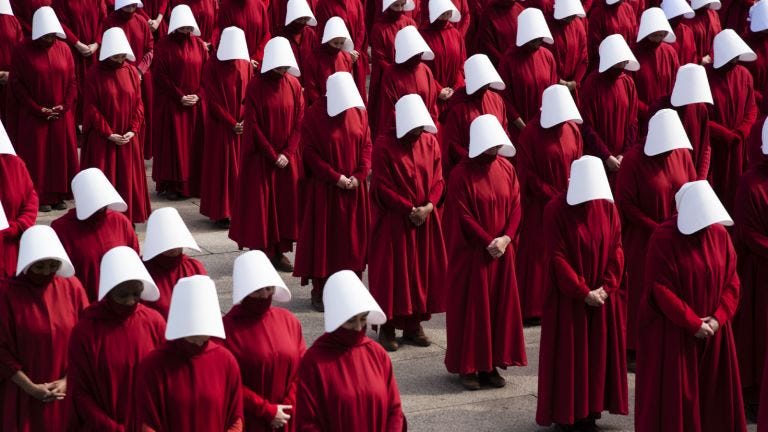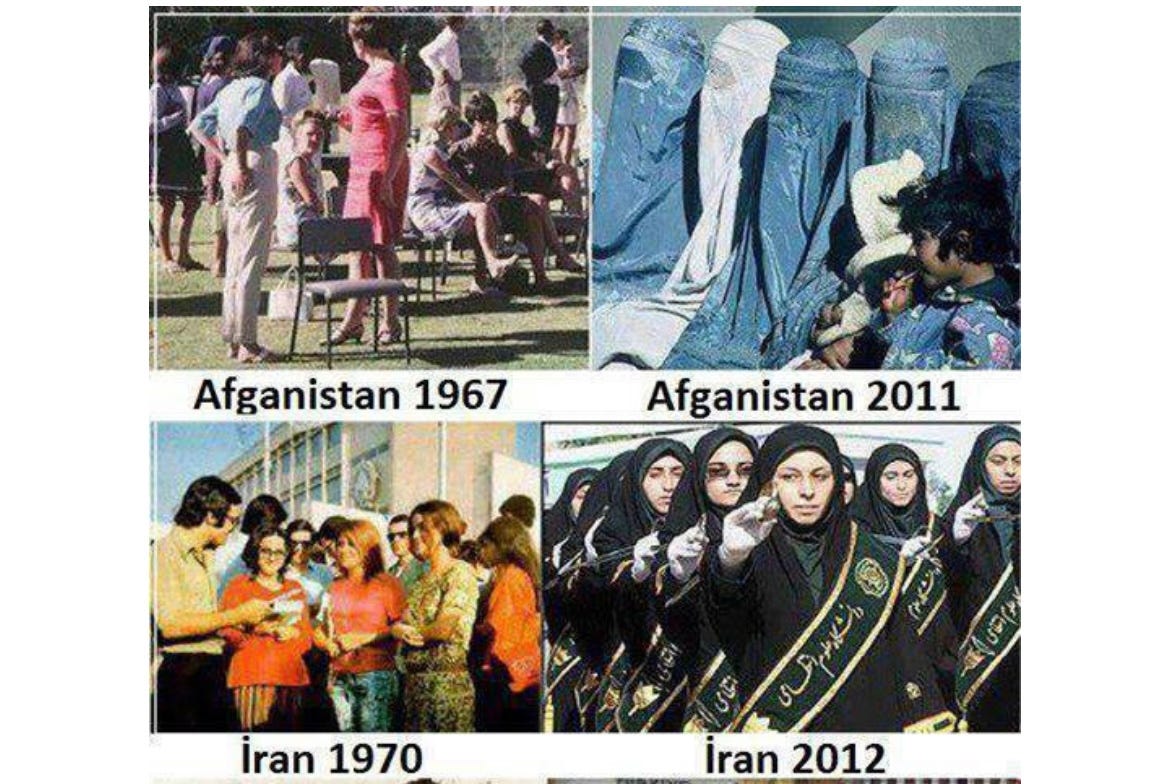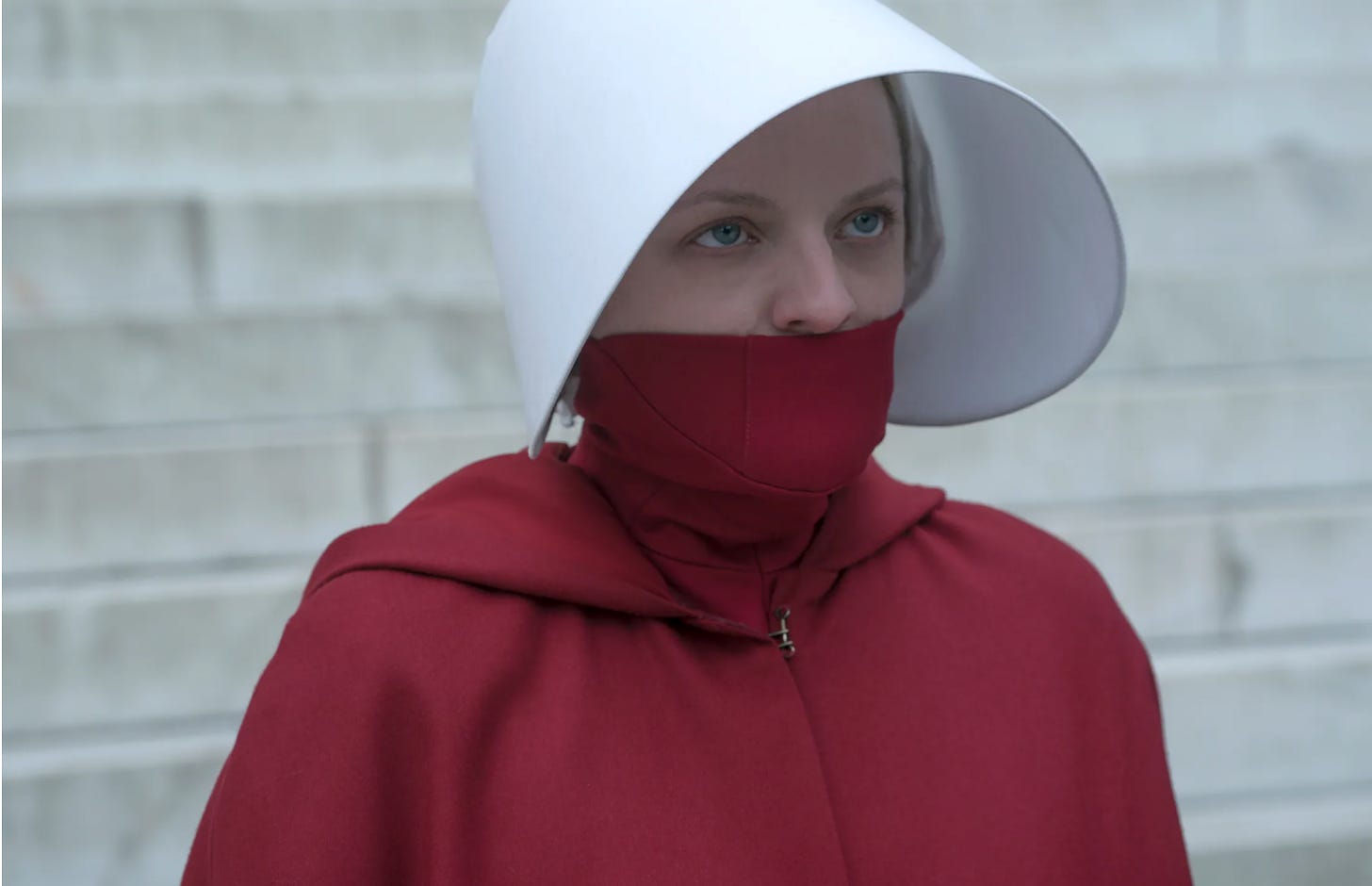(Image credit: Getty Images)
I wonder sometimes how much of a role The Handmaid's Tale plays in making (white) Americans think that abortion would only ever be illegal (again) in a dystopian future, distant and alien to their everyday: a world where women (handmaids) were held down and raped and forced to carry a pregnancy to term against their will. A world that looked nothing like their own, and so is easy to keep at arm’s distance and to sigh “Phew! At least we’re not there!” Whereas they are very much there: Roe v Wade is about to be overturned in the here and now, in the everyday. In the world they know.
It has less to do with the book’s author, Margaret Atwood, and more to do with the inability of (white) Americans to imagine losing a right they’ve had recognized, albeit for less than 50 years.
The idea that a right could be revoked is so alien to so many white Americans, whose very whiteness is undergirded by “manifest destiny'', a doctrine or belief that the United States was destined (by God, its adherents believe) “to expand its dominion and spread democracy and capitalism across the entire North American continent.” Such whiteness is about more–more land, more wealth, more rights–not less.
Needless to say, unless you’re white, “manifest destiny” is manifestly unjust. And it keeps the heart of white nationalism beating.
The same arrogance and naiveté that made so many white Americans think Trump would never become president is that same arrogance and naiveté that made so many think "it would never happen here" about abortion bans as well.
The privilege of whiteness meant that for many in the U.S., there was something wrong with you if you were losing rights. And so banning abortion was the stuff of a dystopia they could keep at a distance, that they refused to recognize.
Never mind that Christian conservatives have been working for this reality in the real world for five decades. And while yes, of course, I've read and was captivated by The Handmaid's Tale, but that's where the very real possibility of losing abortion rights stayed: in a fictional dystopia. Never mind that Margaret Atwood based all its horrors on horrors that had actually happened across the world, and that it was published in 1985, a few years after the Moral Majority and Ronald Reagan joined forces to create exactly this moment we are witnessing in the U.S.
As long as there was no ecological disaster that left women "barren," (as in the novel) and as long as handmaids weren’t the walking incubators for the authoritarian theocracy of Gilead at war with the rest of the United States, then abortion rights were not in danger.
And that's why I love Red Clocks by Leni Zumas, which I included in my compilation Books About Abortion That Aren’t The Handmaid’s Tale. It takes place today, in a very ordinary Oregon town, where no one wears red cloaks to denote handmaid or a blue prim and proper dress to mark one as a wife whose job it is to hold the handmaid down as the Commander rapes her. It takes place in a very ordinary United States, just like today’s, after a Christian fundamentalist–quite similar to Mike Pence, who Zumas mentioned in interviews about her book–is elected to the U.S. presidency and bans abortion, as his platform promised.
Next time you are tempted to ask how women in Iran or Afghanistan could have “let it happen,” ask yourself how you allowed white, Christian zealots to use democracy to cut it at its knees by destroying the right to abortion–a right which most Americans support.
And Red Clocks punctures white supremacy and the delusions it inherited from “manifest destiny,” in a way that The Handmaid’s Tale does not.
“In this novel and beyond, I want my work to face the trouble of whiteness: how it’s been constructed, how its power is maintained, how we could imagine dismantling that power,” Leni Zumas said.
We see Zumas do that for example via the friendship between The Daughter (Mattie), “a white person becoming aware of her own whiteness,” and Yasmine, a young Black woman. Mattie “is starting to realize how white privilege organizes her place in the world.”
“The phrase “ignorant white girl” echoes through the book, and in one of the last chapters we learn why Yasmine said this. It was important to me to frame Mattie’s racial identity, more than Yasmine’s, as the site of conflict and unease,” Zumas said.
The privilege of whiteness meant that for many in the U.S., there was something wrong with you if you were losing rights. It only happened to people who weren't white, far away somewhere.
The same arrogance and naiveté that made so many white Americans think Trump would never become president is that same arrogance and naiveté that made so many think "it would never happen here" about abortion bans as well.
The privilege of whiteness meant that for many in the U.S., there was something wrong with you if you lost a right. It only happened to people who weren't white, far away somewhere. For those same white Americans, only Black and brown people in a far away country ended up with an authoritarian ruler; they deserve him somehow. And for those same white Americans, only Black and brown women were stripped of autonomy over their bodies; again, they deserved it somehow.
It's easy to see the fascists and theocrats when they don't look like you e.g. the Taliban making women cover their face again.
Sonia Niazi, from Tolo News, presents a live broadcast on Sunday. Photograph: Wakil Kohsar/AFP/Getty Images via The Guardian
Or the popularity of pictures of women in Afghanistan and Iran pre-1979.
It’s easy to post pictures from those countries before that year because of the momentous changes 1979 heralded in both countries. And those changes were most visible on women’s bodies. Girls and women are forced to be cultural vectors. Their bodies are the medium upon which culture is engraved, be it through headscarves, chadors, or burqas or genital cutting. And abortion bans.
A popular collage when you search for “Women before the Iranian revolution.”
If 1979 was momentous for Afghanistan–the year of the Soviet invasion–and Iran–the year of its revolution–then it was momentous too for the U.S.--the year that the “Moral Majority” was formed. That white American Christian political organization, associated with the Christian Right and the Republican Party, was instrumental in mobilizing conservative and right wing Christians and turning them into a political force–the political force that has succeeded in bringing the U.S. to where it is today, with Roe v Wade about to be overturned. And always remember the white supremacy at its core.
But there are no pictures of what American women looked like before the Moral Majority “revolution” to compare with how different they look like now, to gauge the ways it has engraved its zealotry on the bodies of women, so it is easier to ignore or downplay that influence because is not as obvious as the ways that the ayatollahs in Iran or the Taliban in Afghanistan have stamped their zealotry on their respective countries. There are no red cloaks of the Handmaids of Margaret Atwood’s novel to point to as “proof” of that zealotry.
A still from The Handmaid’s Tale TV show, Barbara Nitke / ©Hulu via Glamour magazine
Nineteen-Seventy-Nine set into motion momentous changes in the U.S. too but because they’re not signaled by veils and you can’t Google pictures that so clearly show you the “before” to this “after” of fascism and theocracy, it’s as if the U.S. had not been undergoing its own fundamentalist revolution; the Moral Majority “revolution.”
Here’s the thing though: no one is under any illusion that the theocrats in Iran or Afghanistan came to office as a result of free and fair elections. In the U.S., they did. In the U.S. the theocrats are in office as a result of free and fair elections in which many white Americans signaled very clearly they wanted their white supremacist Christian zealotry.
Fascism doesn't happen overnight. Theocracy is not built in a day. Remember the “Creeping Sharia'' crowd–white supremacist, Christian zealots, who passed bills and laws in the early 2000s to ban a non-existent threat from an “Islamic law” that no one in the U.S. said they wanted. Those bills and laws were convenient fodder for fear mongering that fueled their constituents–who were also white supremacist, Christian zealots. Recognize that those who yelled “Creeping Sharia” loudest are the same ones who did not just creep upon the nation with Christian zealotry but announced it at every turn.
I say this in every essay: because they were white and Christian they were therefore not considered dangerous.
I moved to the U.S. in 2000. Over the past two decades, I have learned that many white Americans have a delusional confidence in their government and its institutions. They are childishly naive in believing that institutions will save them
That stubborn belief in U.S. exceptionalism undergirds the refusal to see the fascism that Trump brought. Black, Indigenous, and people of colour have no such delusions. They do not expect institutions to protect them because they are so often hurt by those institutions.
No one is under any illusion that the theocrats in Iran or Afghanistan came to office as a result of free and fair elections. In the U.S., they did. In the U.S. the theocrats are in office as a result of free and fair elections in which many white Americans signaled very clearly they wanted their white supremacist Christian zealotry.
No matter how often those of us from authoritarian countries who know to be suspicious of state power and those of us who have fought fascism–be it via military rule or the rule of religious fundamentalists–warned and warned, white Americans arrogantly shook their head it could not happen here.
No matter how often we warned you that the fate of nations is not a straight line bending towards a “manifest destiny,” of progressive progress, you only saw Iran and women in chadors or Afghanistan and women in burqas and refused to believe that their fate awaited you.
Rights are not guaranteed nor set in stone. And societies, countries, etc do not always march on towards progress and more rights and better lives for all.
History is not a linear march towards "progress."
Roe v Wade will be overturned this summer by the Supreme Court of the United States– a court stacked with Christian zealots. Roe v Wade will be overturned not because of an ecological disaster, not because of war, not because of anything but because of very ordinary Christian zealots who voted for fellow very ordinary white Christian zealots who installed other Christian zealots on courts, including the highest court in the land. Roe v Wade will be overturned as the biggest victory of a white Christian theocratic revolution.
And what will most Americans do about it?
Nothing.
They will not burn things to the ground. They will not invade Congress and refuse to leave. They will not storm the Supreme Court.
Next time you are tempted to ask how women in Iran or Afghanistan could have “let it happen,” ask yourself how you allowed white, Christian zealots to use democracy to cut it at its knees by destroying the right to abortion–a right which most Americans support. And recognize that the destruction of that right is but the first of many other destructions. Anyone who is not an able-bodied, white cisgender heterosexual man should fear what is to come.
The next time white Americans wonder how this could have happened here, remember that while you were looking for Commander Fred, ready to rape Offred as his wife Serena held her down, it was white men who were your fathers, uncles, brothers and husbands who voted for the zealots stripping you of bodily autonomy. And remember that it was white women who were your mothers, aunts, and sisters who were the real-life Serenas, all too willing to foot soldier for the patriarchy in return for its crumbs.
When will you start burning things to the ground? Where is your fucking rage?
Mona Eltahawy is a feminist author, commentator and disruptor of patriarchy. She is editing an anthology on menopause called Bloody Hell! And Other Stories: Adventures in Menopause from Across the Personal and Political Spectrum. Her first book Headscarves and Hymens: Why the Middle East Needs a Sexual Revolution (2015) targeted patriarchy in the Middle East and North Africa and her second The Seven Necessary Sins For Women and Girls (2019) took her disruption worldwide. It is now available in Ireland and the UK. Her commentary has appeared in media around the world and she makes video essays and writes a newsletter as FEMINIST GIANT.
FEMINIST GIANT Newsletter will always be free because I want it to be accessible to all. If you choose a paid subscriptions - thank you! I appreciate your support. If you like this piece and you want to further support my writing, you can like/comment below, forward this article to others, get a paid subscription if you don’t already have one or send a gift subscription to someone else today.







"Next time you are tempted to ask how women in Iran or Afghanistan could have 'let it happen,' ask yourself how you allowed white, Christian zealots to use democracy to cut it at its knees by destroying the right to abortion–a right which most Americans support."
I'm not going to let it happen, even if I have to die as a result. Fuck religious misogynists and their attempts at toxic patriarchy and the resumption of white, Christian colonialism.